Regular doctor visits may feel like an obligation, but for women, certain screenings and health assessments can significantly extend life expectancy. While some, like Pap smears or cholesterol checks, are likely familiar, others are advised based on age, lifestyle or they could be completely new. The recommended starting age for some screening tests has been lowered.
Screenings enable the diagnosis of illnesses before they progress further and become more challenging to treat.
As women's bodies are more complicated when it comes to having babies, they need to do more tests to check that everything is okay. Luckily, there are several tests available for women that make sure to keep women healthy even after the birthing process.
What screenings are essential for women? Here are twelve crucial screenings they should undergo.
Human Papillomavirus Test (HPV):
In the HPV test, a sample is taken from the cervix to detect the presence of the virus, which can potentially lead to cervical cancer. During the procedure, doctors use a speculum to gently collect cells from the cervix and cervical canal using a plastic brush. These samples are then sent to a laboratory for microscopic examination to identify any abnormal cells, signalling potential precancerous changes or, in rare cases, cervical cancer. This beneficial screening procedure plays a crucial role in women’s gynaecological health and cancer prevention.
Pap Smear Test:
Pap smears involve using a small brush to collect cells from around the cervix. However, advancements in understanding cervical cancer development and better testing for the human papillomavirus, which causes this cancer, have rendered annual screening unnecessary.
Women with an average risk should undergo their initial screening at 21, followed by a basic screening every three years until they reach 30. From age 30 to 65, women can maintain this schedule. Alternatively, they can opt for either a standalone HPV test or a combined HPV and basic cytology test every five years. For women over 65 with a history of negative screenings, pap smear screenings are unnecessary.
Mammogram Test:
A mammogram, used for breast cancer screening, entails compressing the breast between plates to capture X-ray images of the breast tissue. Debates have persisted regarding the timing and frequency of this test, considering that the risk of breast cancer rises with age and that frequent screening can lead to false positives, potentially causing harm.
Women commence this screening at 50 years old and undergo it every two years until they reach 74, a period when the tests offer the greatest advantages. For those aged 40 to 50 who wish to undergo screening, it is advised to consult with their physician, according to the recommendations.
Cambridge Hospital offers a range of screening services tailored to meet women’s unique health needs. Whether it’s routine Pap smears, HPV testing, mammograms, or other gynaecological exams, you can trust Cambridge Hospital to provide thorough and compassionate care. Schedule an appointment today to prioritize your reproductive health and well-being.


